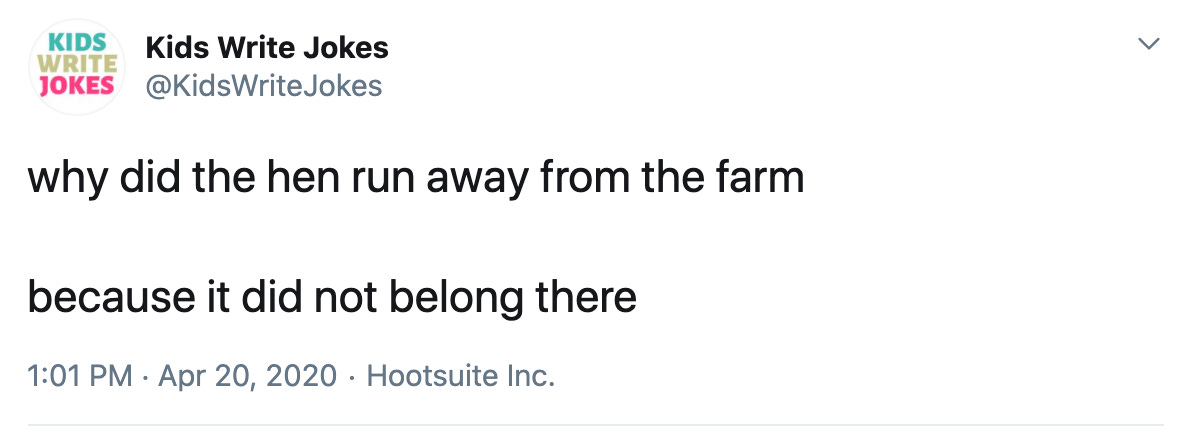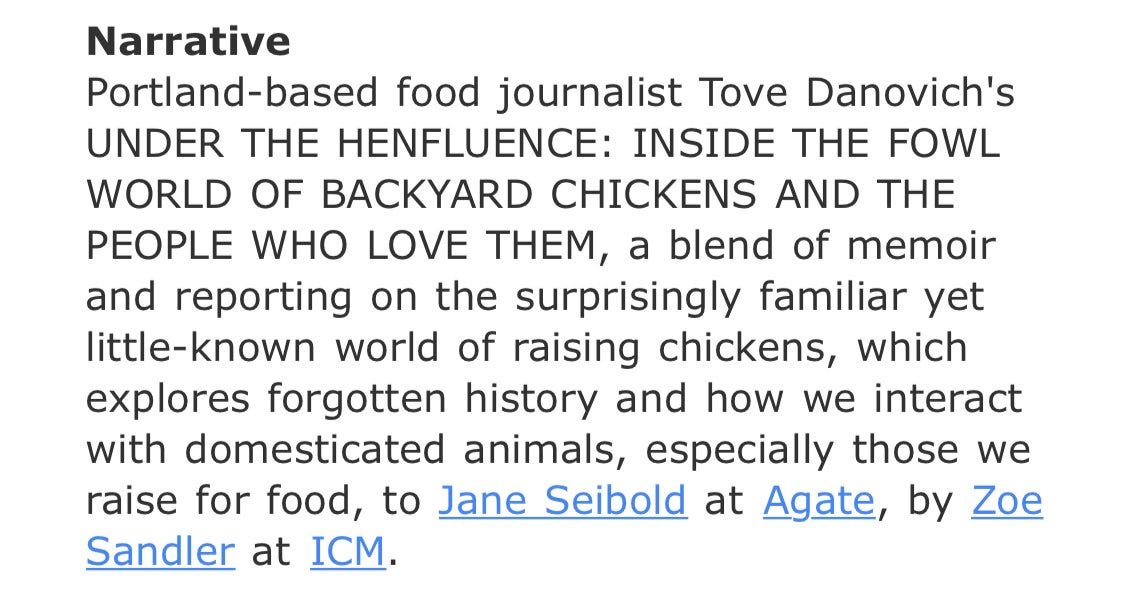Why did the chicken become a joke?
On the strange and dark origins of that joke about the chicken and the road
A few years ago, I stumbled across an account on Twitter @KidsWriteJokes. The conceit is pretty much what it sounds like: people submit jokes told by children. Most of them are not very good but they become hilarious through the sheer repetition of unfunniness. I spent hours reading “jokes” like:
Why wolves howl? / Because they have no idea what they are doing.
knock knock / who is there? / love / love who? / exactly.
what is my sister and her friends? / stupid.
But I soon noticed that there were two big themes in the jokes that kept cropping up time and time again. First, scatological humor is hilarious. (To kids of a certain age, a joke is anything with the word “poo” in it.) Second, there are a lot of jokes involving chickens.



Some are knock knock jokes, some insert chickens into the classic “Why did the [someone] [do something]” joke format, and a lot of them—unsurprisingly—involve a chicken crossing a road. I haven’t done any data collection on @KidsWriteJokes but I would guess that chickens are mentioned more times in these jokes than any other animal.
Thanks to the ubiquity of the classic joke which asks, “Why did the chicken cross the road?” chickens, at least among a certain age group, have become a sort of shorthand for humor.
The first known printing of the joke dates back to 1847, in the midst of a 34-page “Editor’s Table” published in a magazine called The Knickerbocker. The “table” was mostly odd facts and descriptions of received letters or encounters with random people. It would have been entirely forgotten if it weren’t for a few short sentences hidden in the midst of it:
There are 'quips and quillets' which seem actual conundrums, but yet are none. Of such is this: 'Why does a chicken cross the street?['] Are you 'out of town?' Do you 'give it up?' Well, then: 'Because it wants to get on the other side!'
But the way it’s told makes it sound like it was already a known joke at the time of printing. This appears to be the case. The joke, according to an article by theater professor and author Matt Fotis, was developed and popularized by Christy’s Minstrels, a blackface group formed in 1843 that created the three-act format that other later minstrel groups followed. The joke came as part of a back-and-forth between characters Tambo and Bones as well as the interlocutor, a straightman and authority figure who “projected a loftier, less frantic and less ignorant image than the rest of the troupe”, writes Fotis, but was still played by someone in blackface.
This was how the joke played out:
TAMBO: Say, boss, why did the chicken cross the road?
INTERLOCUTOR: Why, I don’t know, Mr. Tambo, why did the chicken cross the road?
BONES: To get to the other side!
Fotis writes (and elaborates on minstrel shows more in his book Satire & The State):
“The joke is meant to embarrass the interlocutor. The answer to the set-up is so obvious that for this supposed educated and pompous character not to know the answer was proof of his inauthenticity — proof that despite his lofty airs, he was no better than [Tambo and Bones].”
It's related to the anti-humor that makes the joke so funny today but in the minstrel show the fact that the interlocutor wouldn’t know the answer to this obvious question was played as an example of his shortcomings, that even for all his education he was still less than the show’s white audience. That, actually, was meant to be the joke. Like a lot of humor or “laughing with you not at you” moments in everyday life, the harmfulness of the joke has less to do with the words themselves than person doing the telling and the reason why the audience is laughing. Everything about the chicken joke as it was told by Christy’s Minstrels was racist—as was the show itself.
But at some point, for better or worse, the joke uncoupled from its minstrel past; its origin story has now been largely forgotten. Poultry journals in the 1900s advertised their chickens with the phrase. Newspapers around the same time sometimes printed the joke at the bottom of a column as filler. Repetition carried the joke through nearly 180 years of American culture (or at least kid’s humor). Was the chicken joke the first “Dad joke” ever told? It’s certainly possible.

Parents still repeat the joke to their kids today and it was printed in joke books throughout the 1900s and now the 2000s. In 2006, children’s illustrators like Mo Willems teamed up to write and illustrate a book giving outlandish answers to the question besides the classic “to get to the other side”. Chickens, as every child still learns, are good for a laugh—even and especially when the joke isn’t all that funny.

News from the Coop
There’s been a lot happening since the last newsletter.
The biggest news is that I’m writing a book! I’ve been working on a book proposal about chickens for a year and a half and it sold in August to Agate. It’ll be a while before the book is finished and published but I’m so excited to know I’ll be sharing this book with you in a few years.

Earlier this month we joined the rest of the West Coast in Bad Air Quality solidarity and spent an entire week hiding inside the house with air filters on high. The chickens, whose coop is all too open to the air, had to come inside and live in our basement for a week. No one had much fun but everyone was safe. I wrote about it for The Washington Post.
I am very thankful that things are back to normal at the coop (and there are more chicken articles in the works!). Because of the book and my increased workload, I’m going to be moving the newsletter to an “every three to four weeks” affair.
If you need a chicken fix in the meantime, you can follow me on Twitter or Instagram.
If you liked this email, please share it with a chicken or animal lover in your life! As always, email me at underthehenfluence@gmail.com with any tips or comments. See you in a few weeks.
-Tove



